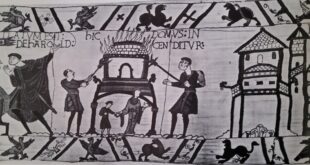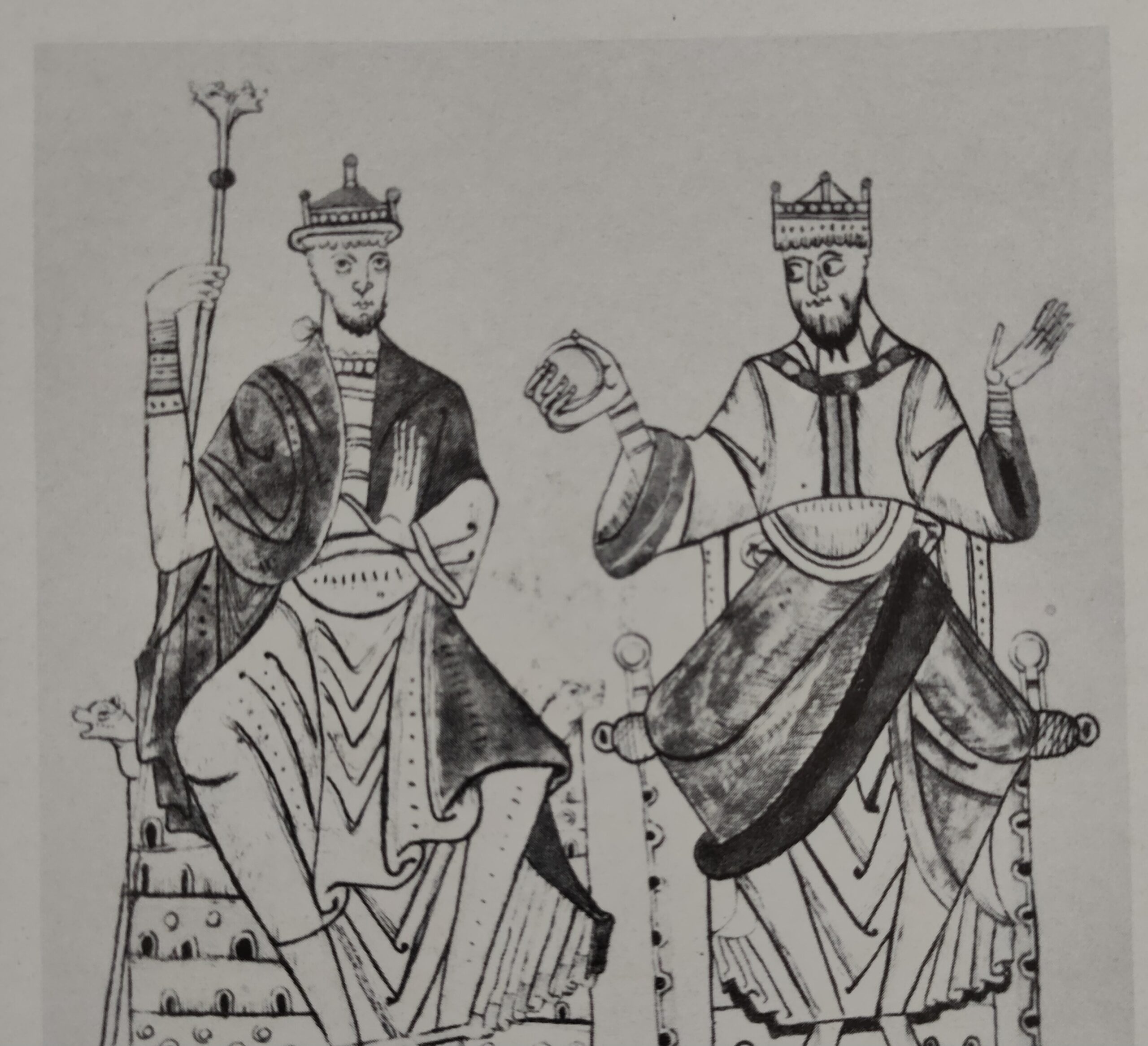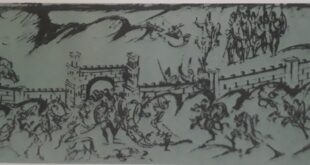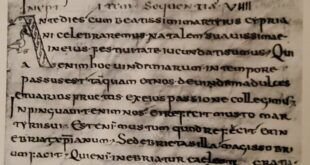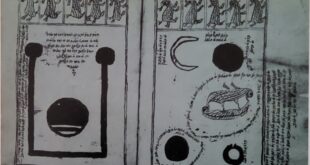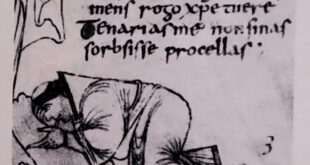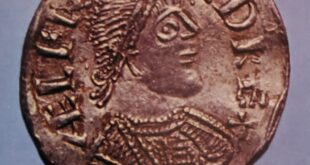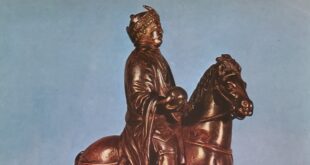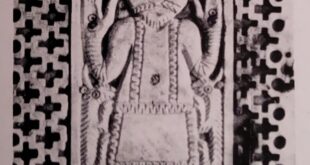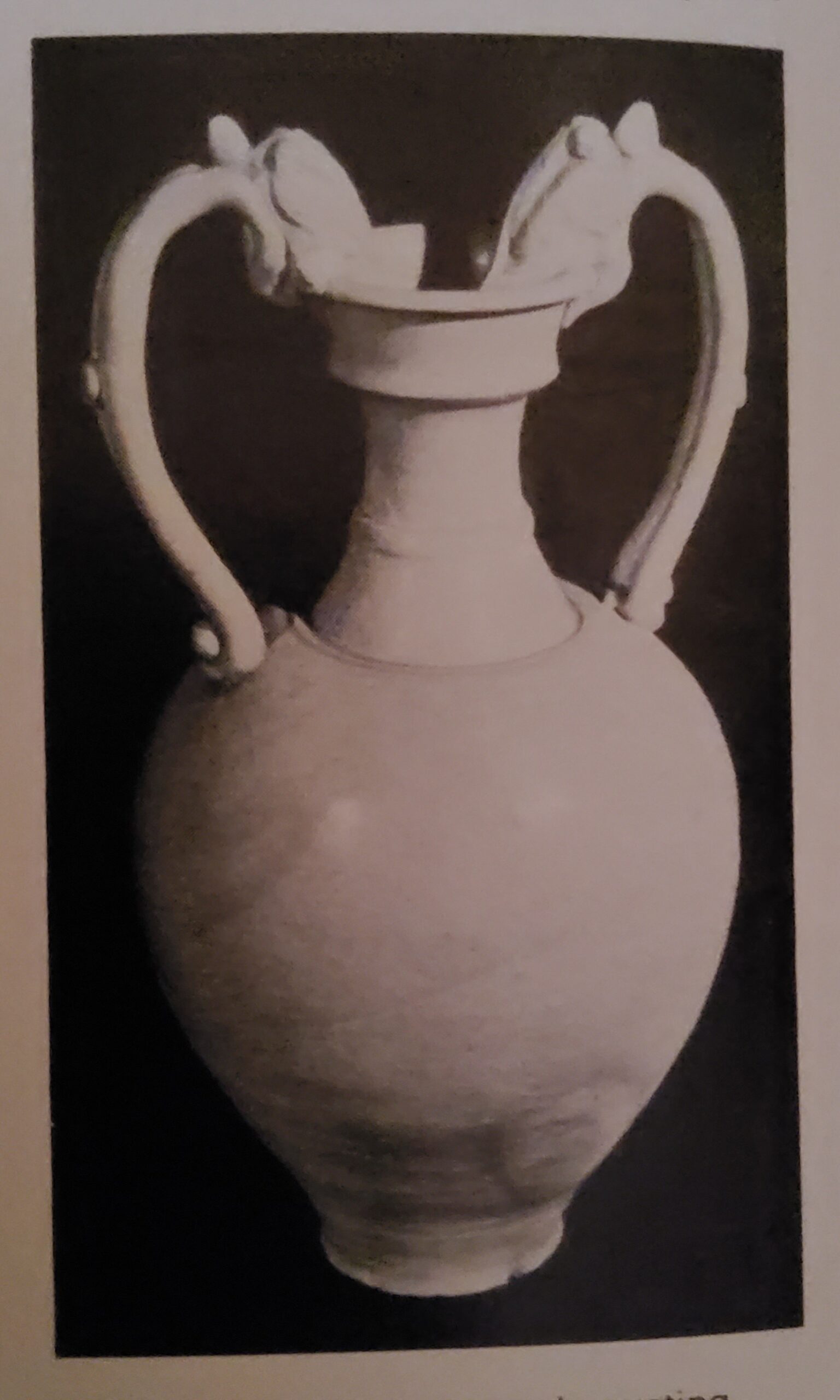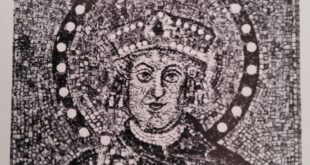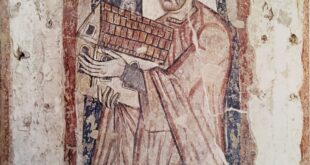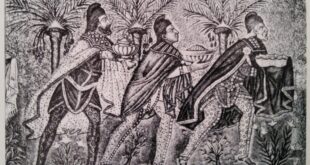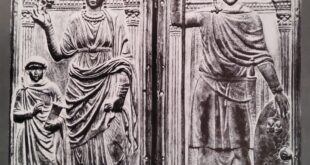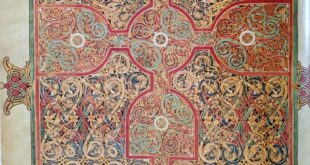Charlemagne’s empire destroyed and dissolved in the ninth century, but the idea of “Europe” survived. By the late tenth century, the eastern and western parts of the Frankish kingdom had coalesced into the dim outlines of the future kingdoms of France and Germany. The Spanish March had disintegrated and been succeeded by the Basque kingdom of Navarre and the county of Barcelona. Italy, broken into a series of ineffectual kingdoms in the peninsula, owed a nominal allegiance to the Emperor (now the King of the east Franks) that was to become gradually less meaningful as the Middle Ages progressed.

After his death in 814, Charlemagne was succeeded by his son Louis I, called the Pious, an amiable, but often too compassionate man. Unable to command his unruly subjects or control his quarrelsome family, Louis compounded the faults of his virtues by his indulgence toward his second wife, Judith of Bavaria and her son Charles. During his reign, Louis was constantly at war with his sons, who finally brought their conflicts to a conclusion with the Treaty of Verdun in 843, three years after Louis’ death. This treaty — one of the earliest records of the emerging vernacular languages, having both German and French texts — gave the imperial title and capital to the eldest son Lothair, who also received a huge tract of territory stretching from the Low Countries to the plains of central Italy. Louis, called the German, received the eastern lands; and the favourite, Charles the Bald, got the western lands, Verdun was the inevitable consequence of the Frankish practice of dividing a father’s possessions; but in the years that followed, the Carolingian house showed a lack of family loyalty and honest dealing that was remarkable even for the times. The settlement of Verdun was crucially revised at the treaty of Mersen in 870, when the artificial central kingdom of Lotharingia (present Lorraine) was divided between the western and eastern kingdoms — a division which, for a thousand years, was a fruitful source of conflict between the successor states of Germany and France.

The Empire Begins to Crumble
The factious rivalries of the Carolingians themselves were compounded by the growing power of the local princes, some of whom had received their lands as the feudal tenants of the royal houses, others of whom claimed the rights of the old pre-Carolingian duchies of Bavaria, Aquitaine and Burgundy, while still others had achieved power as the descendants of the appointed officials of Charlemagne.
The Carolingian Empire in the East came to an end with the reign of Louis the Child, who was succeeded as German king in 911 by Conrad, Duke of Franconia. The chronic divisions of his reign were made worse by the continuing depredations of the Magyars. Throughout the ninth century Europe suffered constant incursions.

In the year 911, the strength of the Norse invaders was formally acknowledged by the Carolingian king, Charles III, known as Charles the Simple. He granted to their leader, Rollo, territories in the north that were to become the duchy of Normandy. The Carolingians in France had been hampered by the opposition of the mighty nobles; since the late ninth century, the chief contender had been the family of Robert the Strong, whose son Eudes was for a time, king. Eudes’ son, Hugh the Great, died in 956, virtual ruler of France. The final demise of the Carolingians came thirty years later, when Hugh the Great’s son, Hugh Capet was elected king.
A pattern of allegiance was imposed on the political divisions that emerged during the tenth century, whereby all but a few of Europe’s de facto rulers acknowledged their theoretical subordination to some other lord. For, during the ninth century, the socio-political structure of medieval Europe, known to later historians as the feudal system, had taken shape. The term is misleadingly precise since feudal Europe was a patchwork of conflicting allegiances, but generalizations can be made. First, power rested in the possession of land; second, the underlying assumption, whatever the practice, was that power and obligation were inseparable. The lord held his land from the king on the condition that he supply a specified number of armed soldiers to the royal army when called upon. Yet even the king himself who was also entitled to certain monetary “aids” — was obligated in turn, to be a good lord to his great tenants and this contained the seeds of the pretexts for rebellion that were often advanced. In turn, the great lords might “infeudate” lesser men with lands, subject to similar obligations; while at the lowest level, the peasants either voluntarily or through force of circumstances surrendered their holdings to a great lord in return for his protection, against both, the central authority and against raiders.

Feudalism was intimately bound up with a system of agriculture, loosely termed the manorial system, in which the land of a village was divided into two or three large open fields, cultivated in common by the villagers, for whom the cost of the increasingly common heavy plough and its valuable ox team was too great for a single family to support. Under this system, each peasant household was allotted strips within the common fields and was in return required to do specified days of work on the lord’s holding.
Thus by the tenth century, despite near political anarchy, Europe had evolved the base of a political, social and agricultural system that was to provide the framework of history for generations to come.
England before Alfred
Before the reign of Alfred the Great, England was a country of one religion but divided political loyalties. The central kingdom of Mercia was ruled by the pagan king Penda, whose reign opened in 633 with the defeat of the Christian Edwin of Northumbria. Christianity was restored in the northern kingdom under the aegis of the king, St. Oswald, and the priest St. Aidan, but in 651, Penda again overthrew his northern rival. Yet three years later, the pagan king himself was overthrown and Christianity was finally established in Northumbria by King Oswy, brother of Oswald.

Northumbria’s brittle political achievement was quite overshadowed by the cultural achievements of her churchmen. The aristocratic cleric, Benedict Biscop, made six visits to Rome and by his foundations of the Benedictine houses at Wearmouth and Jarrow, provided the centres for the brilliant culture that was to follow. St. Willibrord from Ripon (d. 739) was to be the first of a long line of English missionaries who worked for the conversion of the pagan lands to the east of the kingdom of the Franks. Willibrord’s work was magnificently continued by a man from the southwest of England, St. Boniface, who was the first Archbishop of Mainz and was martyred by the pagan Frisians in 754. However, the real flowering of Northumbrian Christianity was the work of the scholars and artists who stayed at home, the anonymous artists of the Lindisfarne Gospels and the Book of Kells and above all, the Venerable Bede. Bede’s great work, An Ecclesiaitical History of the English Nation, can be considered the only reasonably true historical writing in the Middle Ages.
Almost contemporary with this brilliant northern culture, which far outshone anything in Europe and which, through Alcuin of York, was to contribute substantially to the revival of European civilization, the Church in the south of England made major contributions in the field of Church government. After the decision of Whitby, Rome sent a Greek monk, Theodore of Tarsus, to establish the basic structure of the ecclesiastical hierarchy of this new province of the Roman Church. By the time of his death in the early 690s, Theodore had succeeded. Although political pressures in the next century were to cause modifications to his scheme, it retained its basic essentials.

Perhaps the most dramatic break in this pattern was the brief period which Lichfield enjoyed as an archiepiscopal see, to satisfy the demands of the powerful King Offa of Mercia. The defeat of Penda had by no means ended the might of the central kingdom. During the eighth century, it dominated the political stage under its two great kings, Ethelbald and Offa, whose reigns spanned the eighty years from 715 to 796. Indeed, second only to Charlemagne, Offa was the greatest ruler in eighth-century Europe. He ruled by oppression, yet his code of laws were admired by Alfred; his gold coinage, modelled on that of the Caliphate of Damascus, was the first to be struck by an English king; and his European standing was confirmed by the commercial treaty he signed with Charlemagne.
Viking Raids
Nevertheless, it was with Wessex that the future was to lie. Under Egbert, who died in 839, the overlordship of Mercia was eventually challenged; the kings of Kent and Essex, for instance, acknowledged the overlordship of Wessex. Yet, the kingdom exerted little effective influence to the north and only bought the acquiescence of its own powerful vassals by extensive concessions to their ambitions. It was, in effect, the Viking raids that brought Wessex to the fore. Only under these attacks, predominantly from the north and east, did the West Country achieve any strategic significance. Through the historical chance that produced in Wessex the greatest of all the Anglo-Saxon rulers did that strategic position yield its greatest fruit. The first raiders on the coast of Wessex landed near Portland in the year 800; taken by the port reeve to be traders, they were told to report to the nearest royal manor; instead, they killed the port reeve and his men. Such attacks soon became commonplace. In 835 a party of Danes landed at Sheppey; a year later, Egbert of Wessex was defeated by an army of thirty-five shiploads of Danes. Two years later he defeated the Danes and their Cornish allies at Hingston Down.

Thirty years later, the character of the attacks had changed. Instead of merely raiding, the Danes now intended to settle in England. In 865 a great host, led by Ivar the Boneless and Halfdan, sons of the great Viking Ragnar Lothbrok, appeared in East Anglia. In 867 they took York and using it as their base, terrorized Northumbria and Mercia for two years. They then moved south and in 870 established themselves at Reading. In that same year, they suffered a great defeat at the battle of Ashdown at the hands of King Aethelred of Wessex and his twenty year,old brother ; but the Danes had recovered their position within a matter of months. Then, in midApril, the young King Aethelred died. Even as the funeral was being celebrated, news came of another Wessex defeat. The new King Alfred began a reign that was to change the destiny of his nation.
